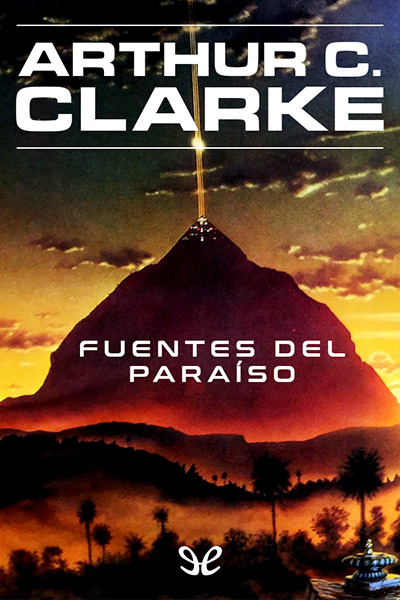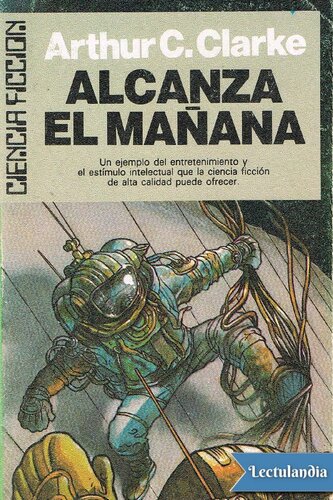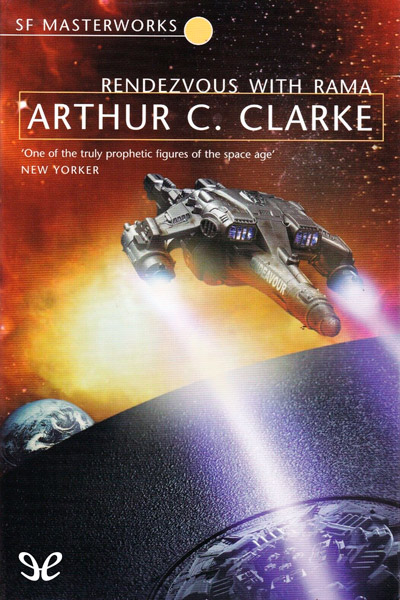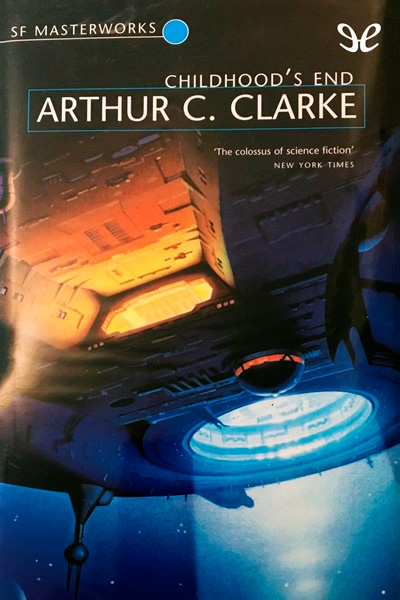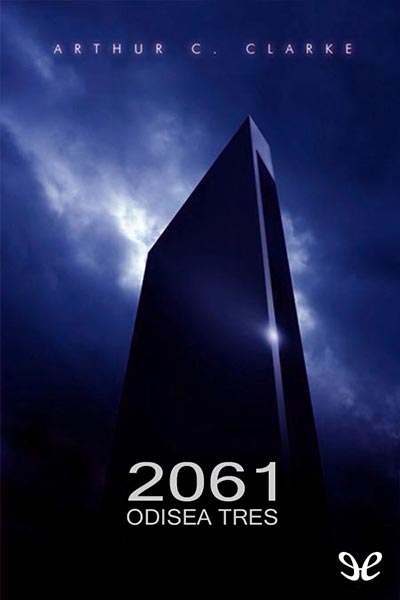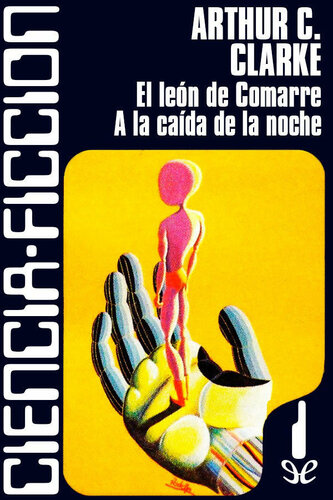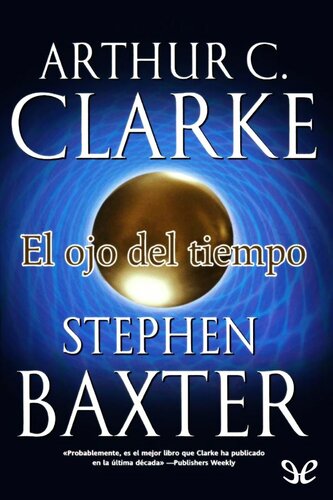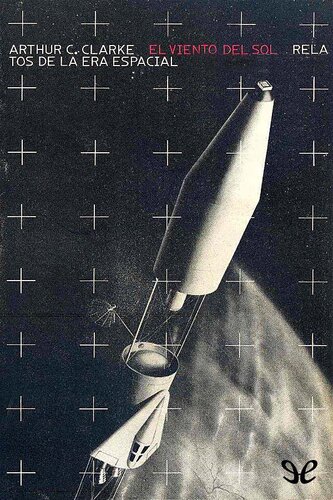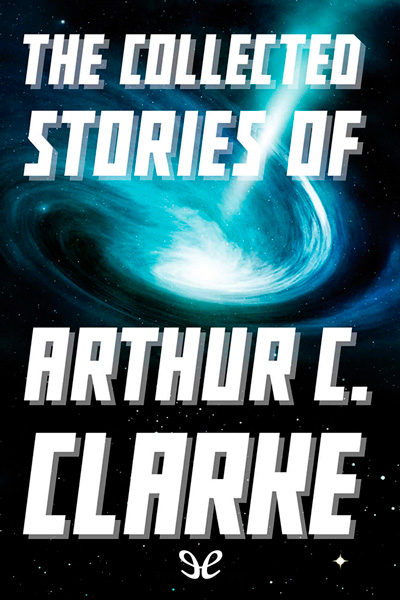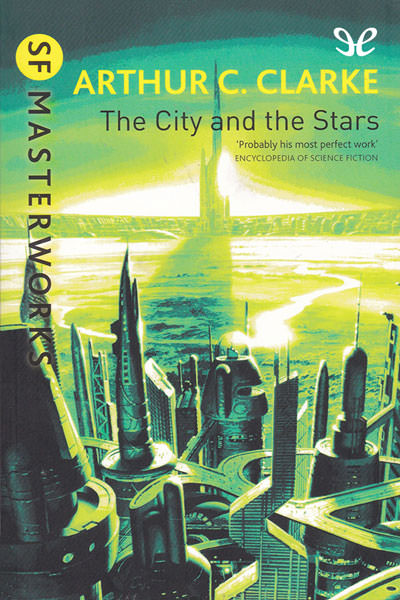oleebook.com
Encontre amb Rama de Arthur C. Clarke
de Arthur C. Clarke - Género: Ciencia ficción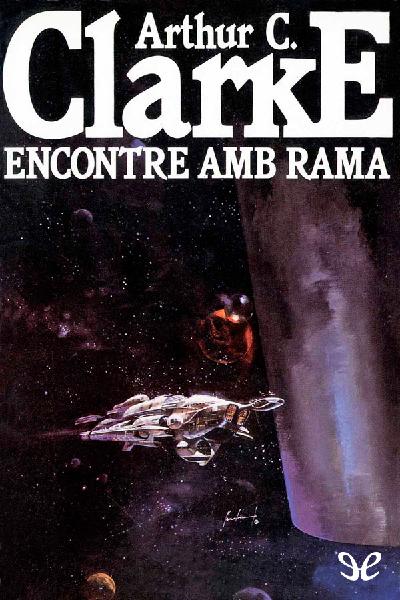
Sinopsis
Després de deu anys d’escassa producció literà ria, Clarke sorprengué tothom amb la publicació d’Encontre amb Rama, que immediatament obtingué els premis Hugo, Nebula, Jupiter, J. W. Campbell Memorial, British Sciencie Fiction, etc.
Es tracta dÂ’una de les obres més madures de lÂ’autor. En ella assoleixen la plenitud algunes de les qualitats que han fet de Clarke un dels escriptors més admirats i llegits de la ciència-ficció mundial: lÂ’esperançat missatge filosòfic, la sòlida base cientÃfica, lÂ’amenitat, claredat i coherència argumental. La mà mestra de Clarke basteix una obra prodigiosa on el sentit de la meravella esdevé el protagonista principal.
«Però hem trobat resposta a una pregunta molt vella. No estem sols. Els estels no tornaran a ser mai més el mateix per a nosaltres».
Descargar
Descargar Encontre amb Rama ePub GratisLibros Recomendados - Relacionados
Reseñas Varias sobre este libro
It's odd to think that this book was published 40 years ago. I don't know why that strikes me as strange, but it does....
It's tempting for me to call this book "Traditional Science Fiction." Or "Classic Science Fiction" or something along those lines. But what I really mean to say is that this is a story where the science is one of the central aspects of the story.
The basic premise of the story is: In the future, humanity finds a alien spacecraft and investigates it.
A lot of the joy of exploration comes from the theory of how a spaceship might really work in terms of physics. How could you generate gravity on a spaceship? How would it travel? What would the aliens be ? What would the purpose of these various pieces of the ships be? (Such as, for example, a large body of water, or featureless buildings on an island?
It's an interesting story, but probably *mostly* interesting for people interested in the genuine science of interstellar/interplanetary travel.
For example, if you enjoyed The Martian, you have a good chance of liking this book. (But be warned, the pacing is much different than The Martian. It's not First Person. It's not conversational. It's not painfully technical, but it was written in a different age.
Of particular interest to me was the fact that many of the smaller plot arcs of the books were very short. By which I mean to say that when a problem arises in the story, the resolution comes very soon afterwards. That limits the tension of the story somewhat, as you don't have time to get too worried over anything before it's fixed.
Lastly, it's important to note that this book ends with many questions unanswered. But the good news is that there are two more books in the series that will explore those questions further, and I trust Clarke to pay me off with good answers by the end of the series.
***
Later edit: I read the sequel, and I have to retract my previous statement. The follow-up book severely damaged my opinion of this book to the point where I don't know if I would reccomend it any more.
So if you were considering reading this book based on my review, you might want to read this first in order to get the whole story...
https://www.goodreads.com/review/show...348 s1 comment Nataliya855 14.2k
“But at least we have answered one ancient question. We are not alone. The stars will never again be the same to us.” I always find it interesting to see whether science fiction classics end up standing up to the test of time, given ever-changing technology, paradigms and culture. Some of them still shine, while others become hopelessly dated and irrelevant.
Well, to me Rama, published in 1973, withstood the test of time, regardless of rare instances of eyebrow-raising.
It is a classic SF novel of first contact - but done a bit differently, and full of the sense of wonder and the beauty of exploration of something amazingly strange and ultimately unknowable, the feeling of awe at mysteries that may be greater than we can imagine. All of it is done in such a short book - just slightly over 200 pages - and it uses each one of them just right (well, maybe minus that ‘bouncy breasts in low gravity’ paragraph).
The first contact here is not really with aliens — but rather with their amazing creation. A crew of a spaceship spends several weeks exploring the apparently dead and deserted colossal alien starship, basically a miniature world with cities and the Cylindrical Sea, built an O’Neill cylinder (lovely video of what that would look if made for humans rather than aliens is here).
ItÂ’s very much a plot-driven story, very different from the now-customary character-driven approach. The sparsely sketched-out characters are there just as the vehicles for the exploration of the true protagonist - Rama itself, the enigmatic starship on an unknowable journey. And that was really interesting, having humans surrender the stage to the location as the true protagonist, because truly in the great scheme of things our existence doesnÂ’t even seem to be a blip on RamaÂ’s radar.
“Feeling extremely foolish, the acting representative of Homo sapiens watched his First Contact stride away across the Raman plain, totally indifferent to his presence.”
The point is Rama and the exploration of it — and not the humans. There are no character arcs, no romantic subplots, no conventional mysteries, no antagonists (minus the brief bomb scene that barely qualifies), no monsters, no battles, no important knowledge exchange — nothing that you would associate with the conventional First Contact story. No, it’s just a journey trying - and failing - to understand an artifact. Maybe a bit of Solaris vibe in the idea that we may not get things and that it’s not about us.
Just sit back and look at the wonders and take notes and speculate on the whys and hows — and that worked so well for me.
ItÂ’s a novel that it engaging without actually trying too hard to be such.
“[…] It had given a final, almost contemptuous proof of its total lack of interest in all the worlds whose peace of mind it had so rudely disturbed.”
And I actually loved the ending — that the mysteries remain mysteries because they are not meant for humans to solve, because humans end up completely inconsequential - especially after they were all becoming so convinced that Rama was trying to take over “our” system and instead it was barely a pit stop on the way. It’s a similar sentiment in Roadside Picnicby Strugatsky brothers — humans are of little importance to the greater cosmic things. I loved how everyone was taken down a peg.
Apparently there are sequels written many years later in collaboration with another writer, supposedly more in the “traditional” space opera style, different from this gem of a book. I haven’t decided whether I’m ready to unveil the mysteries of Rama or whether I am content sticking with it as a standalone story full of mysteries that we will never solve as they aren’t meant for us (as Clarke’s initial intention apparently was).
Probably itÂ’s better to let it stand on its own.
Solid 4 stars.2021-reads hugo-nebula-nominees-and-winners location-is-the-true-protagonist182 s Ahmad Sharabiani9,564 148
Rendezvous with Rama, Arthur C. Clarke
Rendezvous with Rama is a science fiction novel by British writer Arthur C. Clarke first published in 1973.
Set in the 2130's, the story involves a 50-kilometre (31 mile) cylindrical alien star-ship that enters the Solar System.
The story is told from the point of view of a group of human explorers who intercept the ship in an attempt to unlock its mysteries.
The novel won both the Hugo and Nebula awards upon its release, and is regarded as one of the cornerstones in Clarke's bibliography. The concept was later extended with several sequels.
????? ?????? ?????: ?? ???1995??????
??? ???? ?????? ??? ?? ????? ???? ???? ?? ???1371???? ??????? ?? ??? ??? ??? ????? ??? ???? ????? ????????? ???? ????? ?? ????????? ???????? - ???20?
?????: ????? ?? ???? ? ???????: ????? ????? (??) ?????? ?????: ???? ????? ???????? ????? ??? ????? ???1374? ??268?? ???? ????-964554825
????? ??? ?????? ?? ????? «???? 2» ?? «????? ????? ?? ????» ?? ??????? ???? «???? ????» ?? ??? ???? ?? ???1375 ??494? ?? ??? ????? ? ?? ???? ??? ?????? ??? ??? ????9645548276?
??????? «????? ?? ????»? «???? ??»? «??? ????» ? «??? ????»? ??? ???? ???? ?? ???? «????? ?? ?????» ?????? ??????? ?? ?????? ?? ?? ?????? ???????? ????? ???? «?????»? ?? ?????? ?????????? ????-????? ?????? «????? ?? ????»? ??350???? ??? ? ???? ??? ???????? …? «????» ?????? ?? ??? ????? ? ???????? ?? ??? ???? ?? ?? ???? ????? ????? ??? ???? ???? ???????? …? ?? ?????????? ??? ?? ?????? ? ???? ??????? ? ????????? ?? ???????? ??? ????? ?? ???? ???????
??? ????? ???????? ?? ???? ?? ????? ???? ?? ???? ??? ??????? ?????? ????? ? ??? ??? ??? ????? ???? ?? ????? ?????? ????? ??? ???? «????? ?? ????»? ?? ????????? ????? ?????? ???? ?????? ????? ?? ???? ?? ??? ? ????? ??????? ???? ?????? ? ???? ?? ??? ????????? ? ??? ? ??? ???? ??????????? ????????? ?????? ???? ???????? ?? ??????? ?????? ?????? ??? ??????? ??? ?? ???? ? ????? ???? ?????? ? ?????????? ????? ?????? ?? ?? ?????? ?????? ? ???? ???? ???? ? ????? ? ??? ????????? ????? ???????? ?? ??????? ???
????? ?????? ????? 26/09/1399???? ???????? 25/09/1400???? ???????? ?. ??????? Emily (Books with Emily Fox on Youtube)579 65k
I've been trying to read more classic sci-fi and my experience has been very hit and miss so far...
But this was a very interesting take on the whole "first contact with aliens"!
I do wish there was a bit more but it seems I always do. Nevertheless the ending was pretty satisfying, would recommend!164 s Lyn1,917 16.9k
Mysterious and engaging, classic science fiction.
I first read this back in high school, we'll just say a LONG time ago. Since then the concepts, ideas and themes surrounding this archetypal work of science fiction have been a huge influence on works in this genre. Clarke first published this Hugo and Nebula award winner in 1972. The first works that I think of that was influenced by RWR is John Varley's excellent Titan series, first coming out in 1979. His influence on Ridley Scott's Alien, also released in 1979, is clear.
What Clarke did was to affirm that there are and remain mysteries that we will not get, that there are some aspects of scientific research and observation that will remain over our heads.
******2017 reread – I’m advancing my rating, giving this a 5 star. I recall liking it as a younger man, but this is premier, elite SF.
Clarke deservedly won the SF triple crown for this work – Hugo, Nebula and John W. Campbell – as well as a host of other awards including the Locus and British SF Association Award. It’s that good. It should be on a short list of best SF ever.
ClarkeÂ’s Rama has all of whatÂ’s best in a SF story: future science, intrepid explorers, contact with aliens, space, rockets, and mystery. That last element is what wins here, we know about the Ramans, but not all about them by a long shot, there is still much more to know. He has, and we have vicariously through his story, only just scratched the surface of knowledge and what is learned, decades worth of knowledge according to Commander Norman, only leads to more questions.
Excellent, Science Fiction of the highest order.
152 s Cassy274 830
Ladies, have you ever heard the advice that the more you cover up, the sexier you are? Forgo the plunging neckline for the small keyhole. Let the boys use their imagination. Hint, but donÂ’t show.
Clarke evidently had. He dressed this book in a turtleneck, elbow-length gloves, trousers, work boots, and one of those hats with ear flaps. There is barely any flesh showing. What does show is intriguing – a mysterious spaceship, a beautiful flower, an unknown destination, buildings with no doors or windows, living machines. But the book stops the courtship at the flirting stage. Nothing happens. No answers. No aliens massacring the human exploration team.
While this was a nice departure from books nowadays that reveal everything, it was ultimately unsatisfying. Clarke withheld too much for me to really enjoy the book. 2010 award-hugo fiction-scifi-fantasy-paranormal ...more115 s2 comments Henry Avila497 3,280
A large ominous object is discovered entering a remote part of the Solar System in 2131, an impressive thirty miles long and heading in the direction of Earth.You can imagine the implications, indeed... causing a little nervousness back on our world, everyone knows what happened in 2077. If you don't remember since it hasn't occurred yet a large fireball hit the Earth killing hundreds of thousand of people, devastating the great cities and untold trillions of dollars in damages. At last in Project Spaceguard an early warning system was established, a kind of shield can be formed which protects precious Terra from being pulverized again by a roaming asteroid.They also tract the 500,000 space boulders found in the mystifying region between the orbits of distant Mars and Jupiter however now more than fifty years later a new crises arises. Can Spaceguard save us? If it collides with the third planet , Earth will be no more than a memory good or bad. Quickly acquiring the name Rama this large rock (from a Hindu God) , the object keeps surprising us , after a space probe takes pictures it's not an asteroid but an alien spaceship of tremendous size. The long feared aliens have arrived , peaceful or otherwise that is the question? Computer analysis shows the trajectory of Rama will miss Earth and go around the back side of the Sun out into the uncharted, blackness of deep Space, never we hope to return here again. Problem solved right, if you're a sci-fi fan you know better, but humans are not very trusting beings. So the spaceship Endeavour is sent to investigate in command is Captain Norton.When the crew of the Endeavour, finally get inside Rama they are amazed the alien spacecraft, is really a new , vast, strange world to say the least.The only way down to the bottom of Rama are stairways many miles in length, in the darkness so they go, try that folks! Even in low gravity creatures seen below are half animal and half robot"Biot", as they're named by the invaders and look peaceful still where are the Ramans...A large enchanting calm Sea, who believes their eyes here is also discovered by the people from Earth. Great "cities," weird blue lights and exotic structures unexplained atmospheric storms, electrical discharges this Noah's Ark has it all except answers.The crew of the Endeavour will they ever be able to solve the mystery of Rama,the alien craft is getting hotter and hotter as it nears the scorching Sun, time is limited so the explorers must work fast. If the crew could somehow get over the high cliff blocking them and into the unknown, south pole area of Rama . Maybe all the secrets will be explained....A glorious walk into the never-ending place we call imagination...Can't wait until the movie comes out by the same director who made the new Dune.109 s Zain1,611 194
A Delightful Journey!
The Earth spaceship Endeavor is tasked with visiting an alien civilization on a spacecraft that they have named Rama. They eventually arrive at their destination and immediately begin their exploration of the spacecraft thatÂ’s the size of a small planet.
Captain Norton and his crew are awestruck and amazed by the Raman architecture and technology. The design of the cities is marvelous and the technical capabilities of the biots (robots) are impressive.
Rama is its own unique world of engineering and construction and activity. There is a North Pole and a South Pole and there are four suns in its sky.
Rama has the same things on its surface that we have to put up with on Earth. IÂ’m talking about hurricanes and tornadoes, and electrical storms and earthquakes. It even has a cylindrical sea.
The author has ensured that the book is read fast by keeping all the chapters short. And by giving each chapter a cliffhanger he makes it harder to put the book down.
I am fascinated by this book.
Five stars.
Autor del comentario:
=================================
